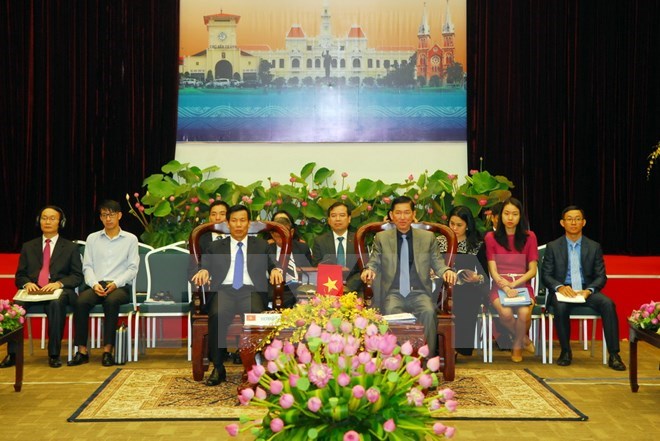Vietnam contributes to dynamic, prosperous Mekong sub-region
- WB helps build environment data centre in Mekong Delta
- EU to increase cooperation with Mekong Delta region
- Mekong Delta facing the challenge of climate change
As the 8th Cambodia-Laos-Myanmar-Vietnam Summit (CLMV-8), the 7th Ayeyawady-Chao Phraya-Mekong Economic Cooperation Strategy Summit (ACMECS-7) and the World Economic Forum on Mekong (WEF-Mekong) are taking place in Hanoi on October 25-26, the Deputy PM wrote an article on the CLMV and ACMECS cooperation frameworks.
According to Minh, Vietnam, as the east gateway of the Mekong sub-region is an indispensable component of the East-West Economic Corridor and the South Economic Corridor.
The country has proactively proposed and implemented many ideas, contributed to the drafting of numerous important documents, and promoted initiatives for the sub-region’s development, while providing development assistance to other countries in the region, including assistance in terms of human resources and infrastructure.
 |
In the CLMV framework, Vietnam has created a CLMV scholarship fund, which offers dozens of scholarships to students from Cambodia, Laos and Myanmar each year. The program is appreciated by beneficiary countries, which have recommended extending it during 2016-2020.
Vietnam acts as a coordinator in many fields in both CLMV and ACMECS frameworks and has implemented many practical activities helping promote comprehensive cooperation among countries.
Well aware of the importance of the sustainable use of natural resources in Mekong river basin, Vietnam actively promoted cooperation on environment and management of water resources. Vietnam is the first country to raise the idea of establishing a working group on environment within the framework of ACMECS and currently is a co-chair of the group.
In 2016, Vietnam hosted several meetings of specialized working groups and senior officials of the CLMV and ACMECS. The country undertook a number of improvements to help the working groups to be more professionally organized and coordinate more smoothly, which is welcomed by CLMV and ACMECS member nations.
The ACMECS-7 and the CLMV-8 in Hanoi, which have the theme of “Towards a dynamic and prosperous Mekong sub-region: Seizing opportunities, shaping the future”, will provide an occasion for leaders to review the implementation of approved action plans and reach consensus on cooperation measures to improve competiveness of economies, promote regional integration and respond to common challenges, for the Mekong sub-region’s future of peace and prosperity.
Deputy PM Minh affirmed his belief that with the determination and efforts from the member countries, the two events will open up a new chapter for Mekong sub-region cooperation and contribute greater to sustainable development and prosperity in the region.
On the occasion, at Vietnam’s initiative, the World Economic Forum on Mekong region (WEF Mekong) will be organized for the first time alongside the CLMV8 and ACMECS7 to promote the region’s potential to the international business community.
The conference also promises to gather creative ideas and bring about cooperation opportunities between world-leading corporations and prestigious enterprises in the region, thus attracting investment capital for infrastructure, human resources and connectivity.
An overview of CLMV and ACMECS history
With the goal of closing the development gap between members of the Association of South East Asian Nations (ASEAN), particularly between the CLMV and the other six members, and facilitating the integration of CLMV into the developing course of the region, on November 28, 2004, leaders of Cambodia, Laos, Myanmar and Vietnam organized the first CLMV Summit in Laos.
The conference passed the Vientiane Statement on Boosting Economic Cooperation and Integration among CLMV with main sectors selected for cooperation being trade-investment, agriculture, industry, transport, tourism and human resources development.
The CLMV is an open mechanism, which aims to optimize the potential and advantages of each member country while serving as a channel to call for financial and technical support from other ASEAN countries and development partners.
The CLMV is also a forum for member countries to coordinate their viewpoints to protect their own interests in the process of economical integration in the ASEAN as well as between ASEAN and partners outside the region such as the US, China, Japan, the Republic of Korea and the European Union.
Meanwhile, the ACMECS was set up by Cambodia, Laos, Myanmar, Thailand and Vietnam with the ultimate goal of ensuring peace, stability, and prosperity. The main goal of ACMECS is to improve competitiveness and promote economic growth in border areas, promote agriculture and industry, create more jobs and narrow income gap between countries.
The ACMECS cooperation focuses on eight fields, which are trade-investment, agriculture, industry-energy, transport, tourism, human resources, health and the environment.
After 13 years of operation, the CLMV and ACMECS cooperation has contributed to strengthening a peaceful and stable environment in the region, promoting economic, trade and investment ties among member countries and narrowing development gap in the ASEAN.
Thanks to extensive economic reforms and efforts in liberalizing and facilitating trade and investment, the Mekong region has become a dynamic development region and an important driving force for ASEAN’s growth.
The highlight of the CLMV and ACMECS cooperation is to aim for specific results with outstanding projects and programs being many new roads in the East-West Economic Corridor and the South Economic Belt, and many bilateral and multilateral agreements on transport, customs and immigration procedures, and scholarships.
The CLMV and ACMECS are also important mechanisms for Mekong countries to coordinate efforts to cement trust and hold dialogues to seek solutions to common challenges like water resources, climate change and diseases based on the harmony of interests of all sides.
According to Deputy PM Minh, the CLMV and ACMECS cooperation still has great potential for improvement, with the immediate requirements of renewing the forms of partnership and selecting appropriate priority cooperation fields, which should suit the situation and needs of each member country.

